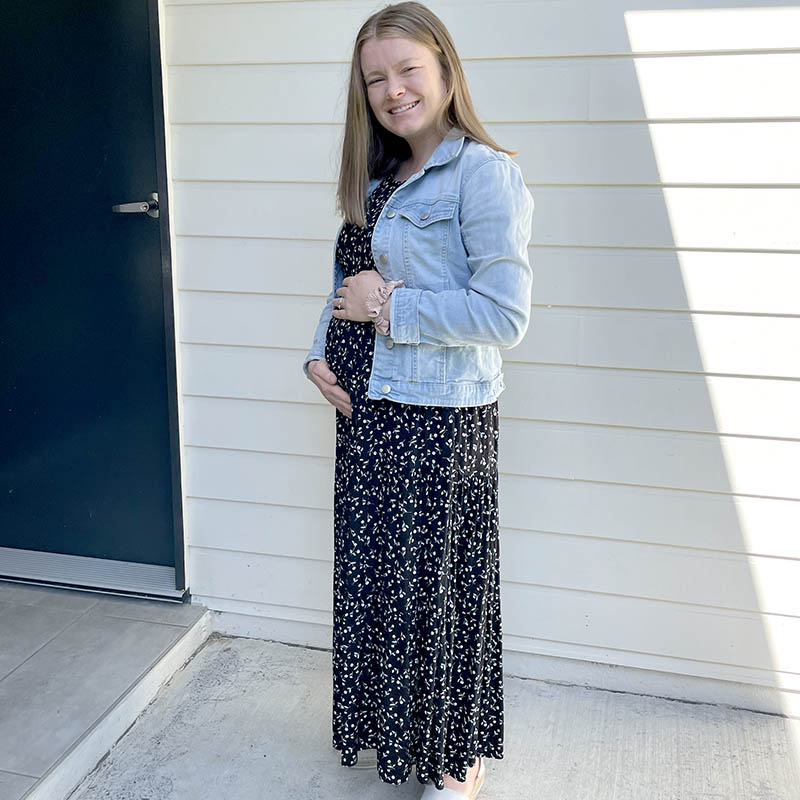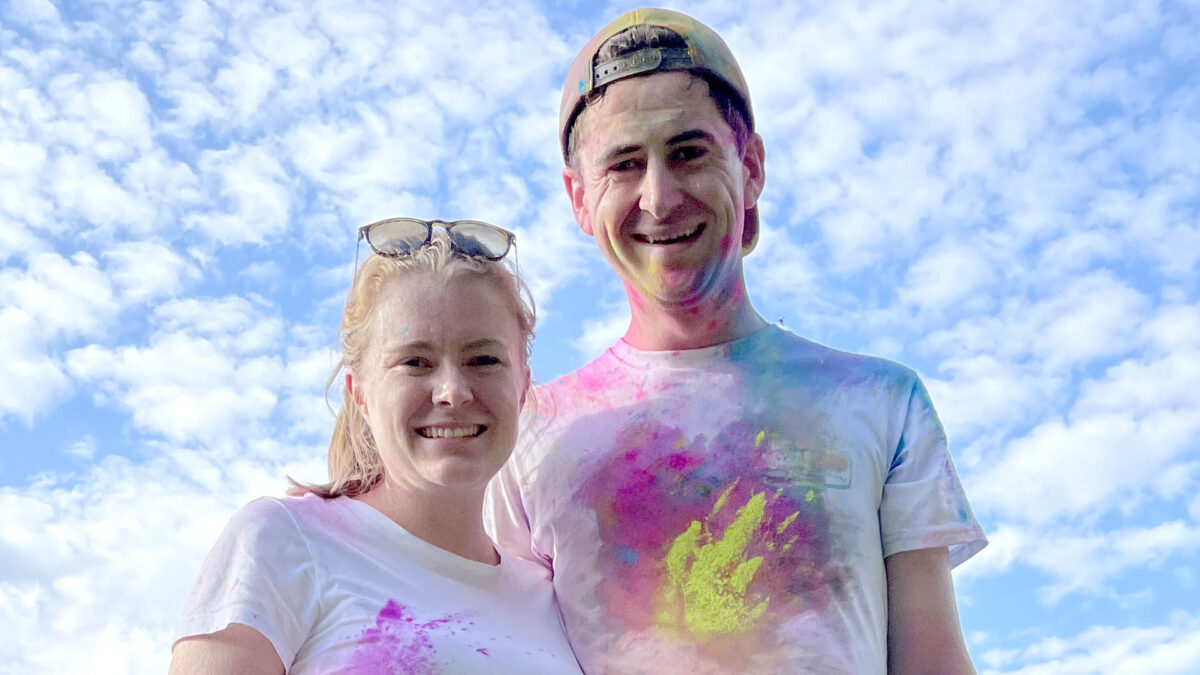[Warning: This story talks about infant death.]
I asked, “Is this as bad as I think it is?” Her reply, “much worse”, hit me in my chest.
When we found out I was pregnant, the mix of fear and excitement filled the living room. We were going to be parents!
We planned to spend the next two months keeping the secret to ourselves, but that proved extremely difficult. At nine weeks pregnant, we made the announcement to our parents. I remember my father in the kitchen silent, as my mother asked, “You’re joking?” and then the room erupted into excitement and tears of joy. My husband’s sister started crying, her dream of being an aunt was finally being fulfilled. We were overjoyed to be embarking on this journey.
The month before, we had done genetic testing just to have peace of mind. The report had come back with a low chance of any complications, but being the type A people we are, we still did the non-invasive prenatal testing at 10 weeks. It was an anxious wait for us, but when the results came back “low risk”, I finally started to relax.
Then our doctor asked, “Do you want to know the sex of your baby?”
We were going to have a boy
I remember sitting in the carpark outside the doctor’s office on a group family FaceTime call. It was a precious moment with both sets of family members all on the same screen.
“It’s a boy!” we said and then the name game began. The toilet wall in my parents’ house became the dedicated place to write names. It was going to be remodelled soon so we wrote every name that could be a possibility.
One name came up on the wall that ended up sticking: Theo.
Seeing Theo move and turn on the screen at our 12-week scan was surreal. Time stood still as we heard his heartbeat for the first time. “Everything is fine,” the doctor said.
At the 20-week scan, I took a photo of my husband and myself before leaving the house. I was at ease and finally determined to live in every moment without worrying about the future. I even put up my second social media post since the announcement.
Seeing our son move, twist and turn was an awe-inspiring experience. He looked so perfect. Then the lady stopped, put down what was in her hand and turned to us. “I have some bad news—his heart.”
Suddenly, we were in the obstetrician’s office, talking about the next two appointments we needed to go to. One, that afternoon to take a sample of the amniotic fluid and another with an echo-cardiologist a few days later, on a Thursday.
An amniocentesis is a very uncomfortable test

They put a very large needle into your belly to take some fluid from the amniotic sack. There was a chance of miscarriage, but we needed more information. We met with the specialist afterwards but we wouldn’t know much until that Friday.
Feeling numb, we somehow made it home and spent the next few days hopeful that everything would be alright. I prayed for Theo’s heart to be healed; for the next appointment to give us hope; that we would meet our son, healthy and happy in the next few months; for this nightmare to be over.
Thursday rolled around very quickly. The echo-cardiologist spent two hours looking at Theo’s heart. He said very little, flicking from one angle to the next, listening to each part of his heart, looking at the flow of blood, looking at his lungs. We sat there, taking in every single moment we had with our son on that screen.
His report was not positive. Theo’s heart was not wired correctly. The left and right arteries were not where they should be, the pulmonary artery was blocked and very undersized. Very little oxygenated blood was making it to our son’s brain, there was a hole in one of the chambers that the doctor couldn’t see the bottom of and he could only see two bronchioles.
He talked us through every scenario.
- What delivery could look like if we made it that far.
- What Theo’s life would be like if he didn’t die at birth.
- The three surgeries Theo would need in the first few days of life.
- The risks of those surgeries on his brain and the rest of his body.
It was a 30-minute conversation that was over before it began. I left thinking, There is hope. There must be hope. There is this one razor thin line we can walk to have our son healthy, living a normal life.
I cried in the shower that night, hugging Theo as best as I could. Praying God, just let him live. Let this be over. Reach down out of heaven and heal my son.
There was no healing—there was no answer
Looking back, I can see God did move. I can see His peace, grace and mercy. I could feel it as we made decisions with our obstetrician the next day. She reality checked my dream of walking the thin line.
I asked, “Is this as bad as I think it is?”
Her reply, “much worse”, hit me in my chest.
The heart is vital to everything in the development of a baby. If it isn’t working, everything else will suffer. Ultimately, I was keeping Theo alive. I was his life support. Without me in a few months, he would know pain and suffering.
Our obstetrician gave us her mobile number and said whatever we wanted to do she would support us—we just needed to decide over the weekend.
We got home and collapsed on the couch. Numb and filled with grief. The joy we had once known was sucked out of us. My husband’s parents were staying with us, looking after us, mostly stress-cooking in the kitchen. My parents were in COVID isolation as close contacts and couldn’t be with us, which was difficult for both my mother and myself.
We spoke with nurses we knew, our families and prayed. Every conversation, every prayer, every tear led us to one place.
We had to terminate the pregnancy
We could not let Theo know pain and suffering in this world. We could not let him know only the four walls of a hospital cot. That was all assuming he made it to full term. We called the obstetrician and we left for the hospital an hour later.
The nurse who met us at the front desk asked, “How can I help?” and my only response was tears. She stepped forward and took my hand as she and my husband walked me down to one of the birthing rooms.
Before she left us, she said, “You are doing the right thing, a brave thing that no mother should have to face. You are putting your child first.”
I took a tablet to start the process of stopping the pregnancy and we were sent home overnight. That night was the longest, loneliest night I have ever felt. Yet at the same time, I could feel God’s arms around us.
The next morning, we left yet again for the hospital. I was induced for labour and told it could take up to 24 hours to feel contractions. I prayed to God for mercy to make this quicker.
I started feeling contractions in two hours and we welcomed our son Theo, sleeping, into the world eight hours later just after 2am, Monday morning. We spent the next 12 precious hours with our son. The midwives, the obstetrician and the staff at the hospital can only be described as angels. I could see God’s love in their faces as they comforted us with compassion and grace. They made every moment with our son special and memorable, organising a photographer and keepsakes that we could treasure forever.
Walking out of the birthing room and leaving our son in his cot was the hardest thing we have ever had to do. The nurses held our hands the whole time, assuring us they would look after him on the way to the morgue.
We decided to have an autopsy in hope that we would be given more answers. We were warned it could take three months for the autopsy to be completed. Yet, if it could save our future children from suffering, the wait seemed important. In God’s mercy, the autopsy took eight days.
One of the hardest things is the unknown, un-lived future that we never were blessed to live
We will never know the colour of his eyes or hair, what his voice or laughter would sound like, what he would like or not like, what his favourite toy would be or what it’s like to love a child as they grow up. That kind of loss is unimaginable.
Yet, with mercy and grace, we can look back on Theo’s short-lived life with both joy and grief. Joy in the moments we had with him and grief for the moments we didn’t.
Through every tear and wordless prayer, I know God is with us. He hears and holds us in our grief. The autopsy report revealed Theo’s heart and lungs were not structured in a way that would have allowed him to live. We also found out it was because of the GDF1 gene presenting in dominant form. This will always result in severe cardiac anomalies.
The report also said that there was a 50 per cent chance of this reoccurring if either of the parents have this gene in dominant form. We are now waiting on the blood test results to tell us if either my husband or myself has the GDF1 gene in dominant form. The likelihood is low—because one of us would be very sick if we did—but it doesn’t make the waiting any easier.
It is a miracle that babies are born healthy. I found throughout our journey that we are not alone in our pain or our story. The many people who reached out to share their stories surprised me. We don’t talk about this hidden pain because of the fear of judgement. Yet, I can’t keep this to myself.
Theo taught me many lessons but two weigh on my mind daily. Firstly, find something that brings you joy every day; love fiercely with an open heart. This is what carries you through the darkest grief.
Secondly, never stay silent in the face of grief. Look it in the eye and sit with it. We grieve in community, not silence. God made us to commune with Him and others. We will only make it through if we give light to the grief we face. I now walk with grief in one hand and joy in the other.
How helpful was this article?
Click on a star to rate it!
4.6 / 5. 20
Be the first to rate this post!
Related posts
Subscribe
Receive personalised articles from experts and wellness inspiration weekly!

